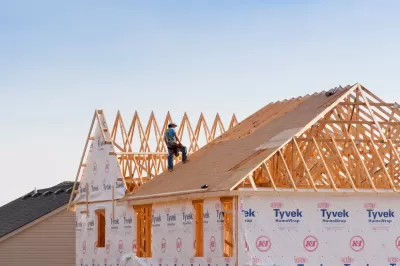The Biden administration this morning released a new program of actions intended to spur housing construction around the United States.

The Biden administration this morning released a housing supply action plan that promises to “help close the housing supply gap” in five years, according to a White House press release. The press release also describes the plan as the “most comprehensive all of government effort to close the housing supply shortfall in history.”
The plan includes legislative and administrative actions, headlined by a new policy that would tie federal competitive grant funding (including funding programs funded through the Infrastructure Investment and Jobs Act) for transportation to zoning and land use policies—cities with less exclusive zoning practices will get higher scores in competitive grant programs. The action would essentially create more influence for the federal government in the traditionally local role of setting zoning and land use regulations.
“Today, the Administration is announcing that DOT will continue to include language encouraging locally driven land use reform, density, rural main street revitalization, and transit-oriented development in BIL and other transportation discretionary grant programs,” according to the press release.
The initial response to the federal government’s foray into local land use regulations so far has received a warm reception among affordable housing advocates. “The administration’s commitment to using federal transportation funds to reduce restrictive local zoning laws, which inhibit construction of apartments and are often deeply rooted in racial exclusion, is especially promising,” said Diane Yentel, president and CEO of the National Low Income Housing Coalition, on Twitter in response to the administration’s announcement.
The new plan also promises to create new financing mechanisms to build and preserve housing units where financing gaps exist, while also expanding funding for existing programs. The former requires Congressional action to pass the Neighborhood Homes Investment Act, included in early versions of of last year's reconciliation bill, in addition to Housing Supply Fund financing proposed in the administration's draft budget.
The latter, “includes making Construction to Permanent loans (where one loan finances the construction but is also a long-term mortgage) more widely available by exploring the feasibility of Fannie Mae purchase of these loans; promoting the use of state, local, and Tribal government COVID-19 recovery funds to expand affordable housing supply; and announcing reforms to the Low Income Housing Tax Credit (LIHTC), which provides credits to private investors developing affordable rental housing, and the HOME Investment Partnerships Program (HOME), which provides grants to states and localities that communities use to fund a wide range of housing activities,” according to the press release.
The plan also promises to limit the number of institutional investors buying government-owned homes by directing "a greater percentage of the supply of FHA- and Enterprise-defaulted asset dispositions to owner-occupants and mission-driven entities instead of large investors" and encouraging the use of Community Development Block Grants (CDBGs) for local acquisition and sales to "owner-occupants and mission-driven entities."
Finally, the plan promises to work with the private sector toward the goal of finishing construction on more homes in 2022 than any year since 2006. The press release clearly enunciates the Biden administration’s support for a supply-side approach to the cost of housing in the United States. “This means building more new homes and preserving existing federally-supported and market-rate affordable housing, ensuring that total new units do not merely replace converted or dilapidated units that get demolished,” reads the press release.
FULL STORY: President Biden Announces New Actions to Ease the Burden of Housing Costs

Maui's Vacation Rental Debate Turns Ugly
Verbal attacks, misinformation campaigns and fistfights plague a high-stakes debate to convert thousands of vacation rentals into long-term housing.

Planetizen Federal Action Tracker
A weekly monitor of how Trump’s orders and actions are impacting planners and planning in America.

San Francisco Suspends Traffic Calming Amidst Record Deaths
Citing “a challenging fiscal landscape,” the city will cease the program on the heels of 42 traffic deaths, including 24 pedestrians.

Defunct Pittsburgh Power Plant to Become Residential Tower
A decommissioned steam heat plant will be redeveloped into almost 100 affordable housing units.

Trump Prompts Restructuring of Transportation Research Board in “Unprecedented Overreach”
The TRB has eliminated more than half of its committees including those focused on climate, equity, and cities.

Amtrak Rolls Out New Orleans to Alabama “Mardi Gras” Train
The new service will operate morning and evening departures between Mobile and New Orleans.
Urban Design for Planners 1: Software Tools
This six-course series explores essential urban design concepts using open source software and equips planners with the tools they need to participate fully in the urban design process.
Planning for Universal Design
Learn the tools for implementing Universal Design in planning regulations.
Heyer Gruel & Associates PA
JM Goldson LLC
Custer County Colorado
City of Camden Redevelopment Agency
City of Astoria
Transportation Research & Education Center (TREC) at Portland State University
Jefferson Parish Government
Camden Redevelopment Agency
City of Claremont





























